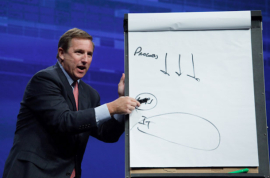Hurd: Oracle's future strategy is integration

Oracle co-president Mark Hurd has predicted a move back to vertical integration for enterprise systems and has said that Oracle will offer more vertical solutions for key industry sectors, as well as a complete stack of hardware and software to simplify maintenance and offer better performance.
"We are now the second biggest application provider in the world and we hope to be the largest," Hurd said at the Future in Review Global West Coast conference in Seattle on Thursday. Oracle already offers vertical solutions in areas like telecommunications, banking, the public sector, utilities and retail.

Oracle co-president Mark Hurd has presented his thoughts on the company's future. Photo credit: Stephen Shankland/CNET News
"It is really now a full suite of software across every problem and we see new areas to forge with the integration of hardware and software into our solutions," Hurd explained. "We're trying to provide more specific solutions to the customer. This is a platform we think has extensibility and scale."
Oracle has previously acquired some of its vertical offerings by buying companies such as PeopleSoft, and Hurd did not rule out further acquisitions "when it makes sense". For now, though, Oracle plans to invest in internal development; Hurd noted that the company had doubled its R&D budget to over $4bn (£2.5bn) for 2010. "Do I think there's going to be consolidation of the industry? Yes," he said. "You can expect more organic technology coming out of Oracle, not less."
Hurd suggested that an obvious benefit of an integrated solution is that a customer only has one supplier to contact if problems occur; something that becomes more important as the downward pressure on IT budgets continues. "Only 25 percent of the world's apps today are packaged apps coming from somebody like Oracle; 75 percent are not. 75 percent of the apps are home grown or have been customised by some company for use at that company — and most of those apps are old," he said.
Hurd predicted a significant reduction in custom enterprise applications to simplify maintenance, saying there will be "a move back towards vertical integration". In addition, he said, having one vendor develop an entire system allows for a more holistic development cycle. "When you are a horizontal company, you build an OS, you build an application, you build hardware," he said. "When you are a hardware company you build hardware through every level of engineering until you get a finished product. Somebody else is building software through every level of engineering until they get a finished product — and the two meet [for the first time] in the marketplace."
By developing its own hardware, OS, middleware and apps to work with Oracle databases, Hurd believes Oracle has an advantage individual vendors cannot match. "It's different when I build the first level of hardware engineering and then after the first level of software engineering, I integrate and I optimise and I test. I make sure I've got the best performance in the world and I do it at every level where I optimise the two together," he said. "I don't just get more accountability out of my supplier, I get a better product. I get a better user experience. I get higher reusability."
The focus on integration does not mean that Oracle will abandon platforms like Linux and Windows Server in favour of Oracle hardware and Solaris, Hurd said. However, he suggested there would be more products like the new Exalogic 'cloud machine' for vertical markets.